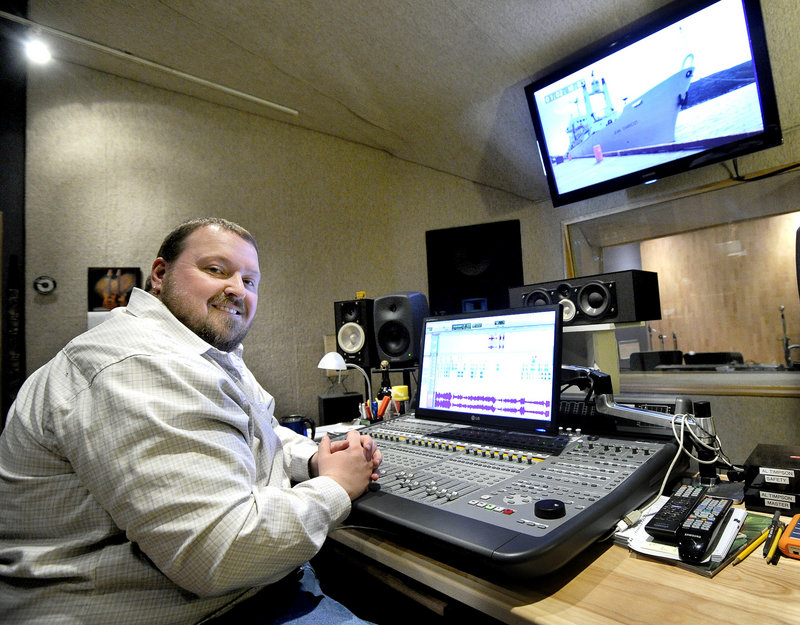Jim Begley is a recording engineer, producer and live sound engineer. Suffice to say, he knows a thing or two about sound.
He graduated from the University of Massachusetts, Lowell with a degree in sound recording technology, and secured first an internship then a full-time gig at The Studio in Portland, where he’s spent the past 15 years sharpening his skills. Begley spends much of his of time working with local bands, mixing sound at Port City Music Hall and engineering sound for things like TV documentaries.
GO visited him at The Studio, where he works most of his magic, and was treated to a tour and a chat next to an array of sophisticated equipment.
OK. So what exactly does a recording engineer do?
I handle everything to do with the recording and documenting and producing of music. Sometimes, if I’m working in a producing fashion, I work with the band on their song arrangements and help fine-tune their songs if required. I help them through the process of recording and overdubbing, adding vocals and creating harmonies. I pretty much flesh out their raw tunes and then mix all of the tracks — adding effects and processing and fixing vocals — and then actually produce a finished two-track master.
Who are some of the local bands you’ve worked with?
I have worked with Paranoid Social Club, As Fast As, Rustic Overtones, Sidecar Radio. Currently, I’m doing a record with The Pubcrawlers, which is awesomely fun, ’cause they are a party everywhere they go. I’m also working with Anna Lombard on her solo record.
What’s the scoop on the Titanic documentary that you’re working on?
I have recently — within the last couple of years — kind of shifted my main focus of what I do as a recording engineer from mixing almost all bands and doing radio to mixing for television for broadcast and for film. It’s very much a similar skill set but a different application.
We hooked up with the Lone Wolf Documentary Group in South Portland close to three years ago. They produce documentaries for National Geographic, Discovery Channel, History Channel, A&E Network, Smithsonian and all those kinds of science channels on every different subject you can possibly imagine.
Because this is the 100th anniversary of Titanic this year, everything has been about it. This one is for the History Channel. I did one last month that was for A&E in 3D for Europe.
So what’s your role in this?
It’s exactly like recording an album, except the material is different. Instead of drums and bass and guitars, I have interviews on camera, sync sound — which is the industry term for on-camera sound, like if you go and shoot somebody on the bow of a ship, that ship makes noise, it’s that sound. Then I also have music, narration, on-camera interviews, studio interviews, sound effects and also what’s called sound design. Sound design is the adding of sound effects to an existing feature to support what’s happening on screen.
Titanic is all those elements being combined. At any one time, I may have 60 to a hundred tracks of things going on in a film. It all has to be EQ’d and compressed and tweaked to sound good.
What is your advice to anyone who wants to get into the sound business?
“Create your own opportunities” is the best piece of advice I can give. This is not the job or the type of industry where you can just graduate college, get a degree and then land like a salaried 9-to-5 type of job. It just doesn’t work that way, especially around here. Maybe at The Hit Factory in New York or some of the larger studios it’s like that, but not around here. You’ve got to be a freelancer to put together enough work to survive. The reason that I do live sound and film mixing and radio commercials and record bands and all that is because I need to do all that to create a body of work.
What’s your favorite part of your job?
The fact that it’s different every day. One day I’m recording with The Pubcrawlers, and the next day I’m on location recording beautiful opera at a local church for the Longfellow Chorus and Orchestra, and then the next day I’m mixing sound design for the Titanic documentary.
Staff Writer Aimsel Ponti can be contacted at 791-6455 or at aponti@pressherald.com
Send questions/comments to the editors.




Success. Please wait for the page to reload. If the page does not reload within 5 seconds, please refresh the page.
Enter your email and password to access comments.
Hi, to comment on stories you must . This profile is in addition to your subscription and website login.
Already have a commenting profile? .
Invalid username/password.
Please check your email to confirm and complete your registration.
Only subscribers are eligible to post comments. Please subscribe or login first for digital access. Here’s why.
Use the form below to reset your password. When you've submitted your account email, we will send an email with a reset code.